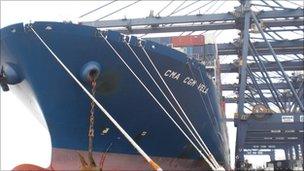Confident China hosts 'Summer Davos'
- Published

World business leaders will meet in the Chinese port city of Dalian
When international business elites gather in the northern Chinese city of Dalian for the World Economic Forum on Wednesday, they will find that their hosts are full of confidence.
Beijing may be battling high inflation in the midst of a once-in-a-decade transition in its top leadership, but China is one of the few bright spots in the global economy.
In fact, since 2007, when Dalian began hosting the forum, China has come to contribute as much to global growth as the Group of Seven rich countries combined.
"The world looks very different from Dalian, than from London or New York," Jeremy Jurgens, the forum's Beijing-based senior director, tells 大象传媒 News.
"The Davos meeting in Switzerland has a strong policy focus. But here, it is all about growth," he adds, saying delegates are drawn to opportunities to meet what the forum calls New Champions.
The theme of this year's conference is how to master long-term, sustainable economic expansion.
But after the historic US debt downgrade and persistent worries about the health of European economies, China's role in the global economy is taking centre stage.
Dalian Port
Dalian Port, the eighth largest container port in China, offers some clues about the pattern of international trade.
The port expects to process 6.3 million 20-foot equivalent units (TEU) worth of containers in 2011.
That figure is due to rise to 10 million TEU by 2013, according to government estimates, due largely to domestic trade.
Gao Xiaodong, an operations executive, says the outlook for trade conducted between China's provinces is more optimistic than the forecast for global trade.
"We're likely to be affected by Europe's debt crisis and North America's economic conditions. But in terms of domestic business though, what we can see over the past few months is that domestic trade is growing rather quickly," he says.
Speedy urbanisation
The reason is clear just a few miles from the port, on the road leading toward downtown Dalian.
There stands a satellite town where the pace of urbanisation seems relentless.
Called simply Dalian Development District, locals say the area was a fishing village just a few years ago.
Officials are keen to move people from villages to cities.
Cui Yunhua says more Chinese are drinking tea as their incomes rise
It is a process repeated across China that tends to create jobs and wealth.
Cui Yunhua, owner of a high-end tea shop, moved to the development area from China's northern Heilongjiang province to take advantage of its transition from village to small city.
Over puer tea that costs more than $200 (拢127) a pound, she explains why business is booming.
"Tea is not a necessity. You don't have to drink it. But as people get wealthier, they are more concerned about their bodies and their health, so many, many people are drinking tea," she says.
The locals also appear to be buying more of almost everything, mirroring a national trend.
China's imports rose by more than 30% in August, setting a record.
It is an early sign that domestic consumption, while still low by international standards, is beginning to take off in a country famous for being a nation of savers.
The 大象传媒's Juliana Liu explores the port city and how it represents China's growing economic confidence